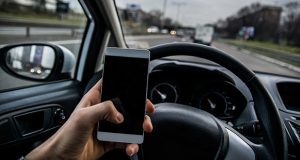Law to restrict teen texting behind the wheel to take effect
Howard Fischer, Capitol Media Services//June 26, 2018//
Law to restrict teen texting behind the wheel to take effect
Howard Fischer, Capitol Media Services//June 26, 2018//
Come Sunday morning, Arizona won’t be only one of two states that has no restrictions on the ability of motorists to use their cell phones while driving.
But just barely.
It applies only to teens with a learner’s permit or those who are within the first six months of being able to drive.
And the law even ties the hands of police, prohibiting them from citing drivers solely because they are seen texting or talking. Motorists can be ticketed only if they had been stopped for some other reason, like speeding.
There also are exceptions for people to call or text during an emergency “in which stopping the motor vehicle is impossible or will create an additional emergency or safety hazard.”
And teens will be able to use a phone’s turn-by-turn navigation system — but only if they enter the location before they start driving and don’t adjust it while behind the wheel.
Still, the legislation, approved more than a year ago, is the state’s first tentative step to set some statewide limits, however minimal.
 More to the point, it was approved by lawmakers pretty much because of how little it did — and how few people it affected.
More to the point, it was approved by lawmakers pretty much because of how little it did — and how few people it affected.
Still, it is a law.
And there are penalties starting at $75 for a first offense. A third offense is a $100 fine, with the teen losing his or her license for 30 days.
And that leaves Montana as the only state in the nation with absolutely no restrictions on what motorists can do with their cell phones while they’re behind the wheel.
Several communities already have their own driving-while-texting bans. Those remain in effect if stricter than the new law.
Arizona lawmakers have tried for years to adopt some sort of statewide restrictions on the use of cell phones for years.
For example, Sen. John Kavanagh, R-Fountain Hills, has proposed to make it illegal for anyone, regardless of age, to send texts or messages while behind the wheel. And Sen. Steve Farley, D-Tucson, has crafted a more comprehensive measure, covering not only texting and messaging but also forbidding making calls without a hands-free device.
But these all died amid a variety of complaints by some lawmakers, ranging from whether existing laws on distracted driving already cover the issue to creating a “nanny state” environment with the government telling people what’s good for them.
In fact, even this narrow new law focused solely on new drivers barely survived — and only because of a political twist of fate.
The measure had been ushered through the Senate by Sen. Karen Fann, R-Prescott, on a 24-6 margin and then gone through the House Committee on Transportation and Infrastructure, gaining approval by a 7-1 margin.
But it stalled when Rep. Phil Lovas, R-Peoria, who chairs the House Rules Committee, through which every bill must pass, refused to clear the bill. Lovas said he feared it might lead to even greater restrictions on adult drivers.
But the fates intervened, in the form of Donald Trump, as Lovas quit to take a post in the Trump administration.
That allowed House Speaker J.D. Mesnard, R-Chandler, to name himself to chair the committee. And Mesnard, who supported the legislation, got the panel to give its OK, setting the stage for the final House approval.
Fann lobbied heavily for the measure, telling colleagues that it really sets no new precedents.
She pointed out there already are special restrictions on new drivers, including limiting the number of unrelated teens who can be in the vehicle as well as prohibiting them from driving after midnight unless it is to go to work or school.
Potentially more significant, Fann promised colleagues that she would not try to follow up this year with an expanded bill.
That, however, did not keep Farley from making a new bid this year which sought to ban all motorists from texting while driving. But it failed, even after he offered compromises to limit the amount of the fines and spelled out that violations could not be used by the Motor Vehicle Division to take away someone’s license, nor be an excuse for an insurance company to raise a motorist’s premiums.



















